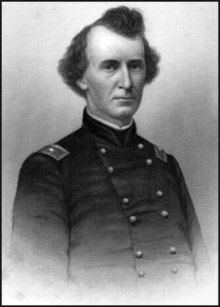W.H.L. Wallace
| William Hervey Lamme Wallace | |
|---|---|

W.H.L. Wallace
|
|
| Born |
July 8, 1821 Urbana, Ohio |
| Died | April 10, 1862 (aged 40) Savannah, Tennessee |
| Place of burial | Wallace-Dickey Cemetery, Ottawa, Illinois |
| Allegiance |
United States of America Union |
| Service/branch |
United States Army Union Army |
| Years of service | 1846 - 1847, 1861 - 1862 |
| Rank |
|
| Battles/wars | |
William Hervey Lamme Wallace (July 8, 1821 – April 10, 1862), more commonly known as W.H.L. Wallace, was a lawyer and a Union general in the American Civil War, considered by Ulysses S. Grant to be one of the Union's greatest generals.
Wallace was born in Urbana, Ohio, the son of John Wallace and Mary Lamme Wallace. In 1836, he was educated at Rock River Seminary in Mount Morris, Illinois. Although he planned to study law with Abraham Lincoln in Springfield, he joined Theophilus Lyle Dickey's practice in Ottawa, Illinois, instead. (Dickey was a friend of Lincoln's and would eventually be a justice on the Illinois Supreme Court.) In 1851 he married Dickey's daughter, Martha Ann. Wallace became licensed in law in 1846 and that same year he joined the 1st Illinois Infantry as a private. He rose to the rank second lieutenant and adjutant and participated in the Battle of Buena Vista along with a few other minor engagements. After this brief experience in the Mexican-American War he became district attorney in 1853.
At the start of the Civil War, Wallace volunteered as a private with the 11th Illinois Infantry, which was assembled in Springfield. He was then elected the unit's colonel. He rose up the ranks and commanded a brigade of Brig. Gen. John A. McClernand's division of Grant's Army of the Tennessee at the Battle of Fort Donelson in 1862. During the battle much of McClernand's division had been driven back with heavy losses and Wallace's coolness under fire was especially noted. Brig. Gen. Lew Wallace described the colonel as looking like a "farmer coming from a hard day's plowing". After this first time meeting upon the Fort Donelson battlefield, the two quickly learned each possessed the same surname and had commanded their respective states' 11th regiments, prompting Lew Wallace to muse the coincidence must have caused "great profanity in the army post office".
...
Wikipedia
